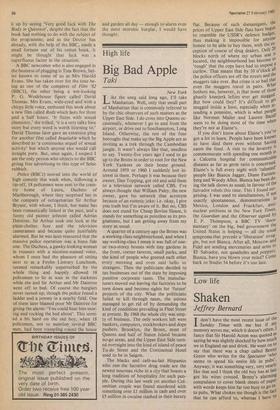High life
Big Bad Apple
Taki
New York T ike the song said long ago, I'll take
Manhattan. Well, only that small part of Manhattan that is commonly referred to by the chic observers of such matters as the Upper East Side. I do cross into Queens oc- casionally, whenever I go to and from the airport, or drive out to Southampton, Long Island. Otherwise, the rest of the four boroughs that make up the Big Apple are as inviting as a trek through the Cambodian jungle. It wasn't always like that, needless to say. Twenty-five years ago I used to go up to the Bronx in order to root for the New York Yankees on their home ground. Around 1959 or 1960 I suddenly lost in- terest in them. Perhaps it was because their owner, Dan Topping, got old and sold them to a television network called CBS. I've always thought that William Paley, the new owner, gave his network that acronym because of an esoteric joke: i.e. okay, I give you trash but I'm aware of it. But no, CBS does not stand for Cheap Bovine Sleaze, it stands for something as pointless as its pro- grammes, but I am getting away from my story as usual.
A quarter of a century ago the Bronx was a working-class neighbourhood, and when I say working-class I mean it was full of one- or two-storey houses with tiny gardens in the front, corner taverns, small parks, and the kind of people who greeted each other every morning and even said hello to strangers. Then the politicians decided to tax businesses out of the state by imposing punitive corporate taxes. The manufac- turers moved out leaving the factories to be torn down and become sights for 'future' projects of the city. What the politicians failed to kill through taxes, the unions managed to get rid of by demanding the kind of conditions prevailing in Fleet Street at present. By 1968 the whole city was emp- ty of business. The only workers left were bankers, computers, stockbrokers and dope pushers. Brooklyn, the Bronx, most of Queens and half of Staten Island became no-go areas, and the Upper East Side turn- ed overnight into the kind of island of peace Tu-do Street and the Continental Hotel used to be in Saigon.
The blacks and cafe-au-lait. Hispanics who run- the lucrative drug trade are the newest nouveau riche in a city that boasts a long tradition of hospitality for such peo- ple. During this last week yet another Col- ombian couple was found murdered with something over £1 million in cash and over £5 million in cocaine stashed in their luxury
flat. Because of such shenanigans, the prices of Upper East Side flats have begun to resemble the USSR's defence budget, thus making it impossible for anyone honest to be able to buy them, with the ex- ception of course of drug dealers. Only 20 blocks north of where my urban seat Is located, the neighbourhood has become so `tough' that the cops have had to impose a curfew. That means that by 10 o'clock all the police officers are off the streets and the muggers take over. But crime is so bad that even the muggers travel in pairs. What bothers me, however, is that none of those ghastly kneejerk lefties ever get mugged. But how could they? It's difficult to get mugged inside a limo, especially when at- tending a premiere, which is what neoPle, like Norman Mailer and Lauren Baal seem to be doing most of the time when they're not at Elaine's. If you don't know about Elaine's You've got a lot to learn. People have been known to have died there even without having eaten the food. A visit to the lavatory Is commensurate with spending one month In a Calcutta hospital for communicable diseases as far as germ ratio is concerneo;• Elaine's is full every night with `talented' people like Bianca Jagger, Diane Fursten- berg and Woody Allen. Bianca has been do- ing the talk shows as usual; in favour of the Salvador rebels this time. This I found sur- prising. I was used to simultaneous, if h9t exactly spontaneous, demonstrations in Mexico, London and Frankfurt, anti- nuclear petitions in the New York Times, the Guardian and the Observer signed by E. P. Thompson, a BBC TV 'docu- mentary' on the big, bad government the United States is helping — all the usual symptoms that precede a 'liberation' strug- gle, but not Bianca. After all, Moscow and Fidel are sending mercenaries and arms to El Salvador, not quaaludes and poppers. Bianca, have you blown your mind? Cottle back to Studio 54 before it's too late.




































 Previous page
Previous page